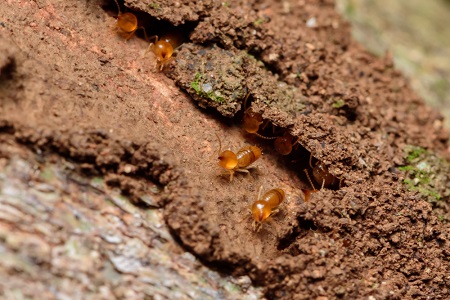What Is Soil Termite Treatment and When Is It Done?
 Termites, often referred to as “silent invaders”, operate sneakily and eat away the wooden structures, weakening the very core of the building. Subterranean termites are the most common culprits and they thrive in the soil. Their underground fortress often goes undetected, helping them silently gnaw away the house. Soil termite treatment is essential to get rid of subterranean termites.
Termites, often referred to as “silent invaders”, operate sneakily and eat away the wooden structures, weakening the very core of the building. Subterranean termites are the most common culprits and they thrive in the soil. Their underground fortress often goes undetected, helping them silently gnaw away the house. Soil termite treatment is essential to get rid of subterranean termites.
Soil Treatment for Termites – A Shield Below the Ground
Subterranean termites tend to create exploratory tunnels from their nests in search of food. They move around searching for food and if they gain access to a structure, they tunnel through to it. They create mud tubes, made with a combination of wood, soil, and saliva, through which they safely travel from the source of food to their nest.
Termites prefer dark and damp places and hence easily avoid being spotted. If you are spotting mud tubes in your home, know that your house is under severe attack from termites. Contact a termite control professional immediately and have your house inspected.
Soil termite treatment, simply put, involves creating an underground barrier around the structure which will prevent termites from getting past it. The barrier can thwart termites’ entry and safeguard the foundation and other wooden parts of the structure.
Also Read: Identifying and Controlling Subterranean Termites
How Is Soil Treatment for Termites Done?
The primary aim of the treatment is to treat the soil around and under the building to protect the structure from termite infestation. This involves digging a trench around the perimeter of the building to a certain level from the top of the foundations.
The soil that is taken out is mixed with termiticides and is refilled into the trench. Now there is a treated zone around the building which is hard for the termites to cross.
How Does Soil Termite Treatment Work?
How it works depends on the type of termiticide used for the treatment. For example, in the past, most companies used repellent termiticides which repelled the termites when they came into contact with the treated soil. While this is an effective method to control termite infestations in buildings, the termites could still find a way around the barrier or affect the trees or plants in the garden outside the barrier.
There is a choice of employing non-repellent chemicals for the soil treatment process. When these types of termiticides are used, the termites that come in contact with the treated soil are killed. This is an effective method for controlling termites but the dead termites around the barrier can warn the live termites and they might avoid it and find a new entry path.
Other chemicals can act slowly in the termite’s body once it digests it. These termiticides do not immediately kill the termites. The termites also unknowingly pass the chemical to the other termites in the colony. Soon, the whole colony of termites is poisoned. This type of termiticide is considered to be more effective when it comes to soil termite treatment. You need to reapply the chemical once it wears out. Usually, most soil termite treatments come with a reapplication rate of 5-6 years.
When Should Soil Termite Treatment Be Done?
Most people look for termite treatments only when the termite infestation becomes severe. The best time to employ soil termite treatment is when you build your house. Soil termite treatment is most effective when it is done in the pre-construction stage. While the treatment can also be done post-construction, you’ll have to dig up your perfect lawn and basically, the hassle is too much. So, if your house is in the pre-construction stage, make sure to add soil termite treatment to your to-do agenda.
Also Read: Termite Control Guide for Homebuilders
Why Do You Need a Professional for Soil Termite Treatment?
The success of the soil termite treatment depends on the details. For example, to form an effective barrier, you need to create a continuous band of termiticide-treated soil against the foundation of the structure. Even a small break in the barrier can serve as an entry point for termites.
The rate of application of termiticides to the soil also matters. It mostly depends on the type of soil and the perimeter of the structure. A professional termite control expert will know all the right ways to go about the treatment.
HiTech Termite Control
While soil termite treatment is a robust method to avoid termites, you still need to be careful. Book an annual termite inspection with us to find possible termite infestations early. Check out our website here.
- Feb 12, 2024
